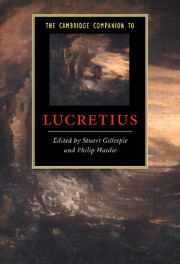Book contents
- Frontmatter
- Introduction
- Part I: Antiquity
- Part II: Themes
- Part III: Reception
- 12 Lucretius in the Middle Ages and early Renaissance: transmission and scholarship
- 13 Lucretius in the Italian Renaissance
- 14 Lucretius in early modern France
- 15 Lucretius in the English Renaissance
- 16 The English voices of Lucretius from Lucy Hutchinson to John Mason Good
- 17 Lucretius in the European Enlightenment
- 18 Lucretius in Romantic and Victorian Britain
- 19 Lucretius and the moderns
- Dateline
- List of works cited
- Index of Main Lucretian Passages Discussed
- General Index
19 - Lucretius and the moderns
from Part III: - Reception
Published online by Cambridge University Press: 28 May 2010
- Frontmatter
- Introduction
- Part I: Antiquity
- Part II: Themes
- Part III: Reception
- 12 Lucretius in the Middle Ages and early Renaissance: transmission and scholarship
- 13 Lucretius in the Italian Renaissance
- 14 Lucretius in early modern France
- 15 Lucretius in the English Renaissance
- 16 The English voices of Lucretius from Lucy Hutchinson to John Mason Good
- 17 Lucretius in the European Enlightenment
- 18 Lucretius in Romantic and Victorian Britain
- 19 Lucretius and the moderns
- Dateline
- List of works cited
- Index of Main Lucretian Passages Discussed
- General Index
Summary
Macaulay, in his 1856 Encyclopedia Britannica essay on Oliver Goldsmith, proclaimed: ‘the finest poem in the Latin language, indeed the finest didactic poem in any language, was written in defence of the silliest and meanest of all systems of natural and moral philosophy’. In the Introduction to his 1976 translation of the DRN, C. H. Sisson claims: ‘The De Rerum Natura is a vision, much as Piers Plowman is a vision, though Lucretius is much more powerful as well as more sophisticated. The moments of insight use the Epicurean theory as a means of expression, but the vision is of something more terrible than the theory.’ The citing of Langland as an analogue is suggestive, the distance opened between Lucretius’ vision and the theory it uses, ponderable; and we shall return to both in this account of primarily anglophone responses to Lucretius from about 1890 to the present. But to juxtapose Macaulay and Sisson signals one notable shift in the later twentieth-century reception of Lucretius, from the 1970s on: the response to his poem as offering serious arguments, requiring and rewarding a sustained philosophical engagement. This will be addressed below; but ‘philosophical’ should be stressed. For the second half of the twentieth century the physical science of the poem is no longer a central focus as it had been in the later nineteenth century, when Lucretius was constantly correlated with contemporary science, whether in enthusiastic appraisal or jaundiced critique. W. R. Johnson supplies a telling overview of the disappearance of this approach in the twentieth century.
- Type
- Chapter
- Information
- The Cambridge Companion to Lucretius , pp. 306 - 324Publisher: Cambridge University PressPrint publication year: 2007
- 3
- Cited by

